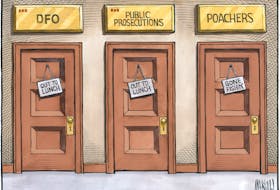
Transported back in time to 1914, the students were given the political context and consequences by an expert on military and international affairs, renowned Canadian author, historian and journalist Gwynne Dyer.
The sought-after speaker travelled to schools throughout Pictou County to deliver a timely lecture on Canada’s involvement in the world wars during this centennial year of the start of the First World War.
Students actively took notes as Dyer spoke about Canada’s strong ties to Britain and certain rights and responsibilities the country had in being a part of ‘the gang’ – the British Commonwealth.
“We sent troops to fight in a British war in Africa,” said Dyer, referring to the Boer War in South Africa in 1899 to 1902. “But it wasn’t really Africa the British were thinking of, they were thinking of whether or not they’d have to fight a major war in Europe again. They didn’t have enough people so they wanted the Canadians and other people to come too.”
Canada eventually sent over 7,000 soldiers to fight in the Boer War. Around 270 were killed.
Part of being in the British Commonwealth was, according to Dyer, an insurance policy that if Canada helped with British military exploits around the world, then Britain would defend Canada in the event of an American invasion. However, after some sabre rattling between the U.S. and U.K. over the borders of a South American colony, the British Army questioned the soundness of war with America.
“So they did some planning and evaluations for six months, and the army came back and told the British government and concluded we must never fight the U.S. because we’d lose,” said Dyer. “But the last sentence of this document says this conclusion was not discussed with the government of Canada.”
They had, in effect, cancelled our insurance policy and they didn’t tell us, said Dyer. Though he noted the Canadian government wasn’t informed, not because the British were particularly callous, but simply because this was the manner in which great powers operate on the world stage.
“Empires are full of sentiment and emotion on the fringes but in the centre they’re always run by calculation.”
Predictably, Canada answered the call when war was declared in the summer of 1914. It was to be a war like no other before it because two things had changed.
“Europe got very rich and could fund massive armies and the weapons got very good at killing,” he said. “WWI was just another one of these wars where the territories get shuffled around a bit.”
Of an expeditionary force of 620,000 soldiers, 67,000 were killed and 250,000 were wounded. So why did Canada not learn its lesson after WWI and enthusiastically signed up for WWII? Dyer said it was about validation for those lost in the Great War.
“To give meaning to those who died some 30 years earlier,” he said. “You couldn’t just say it was a huge mistake back in 1914 that we went over. So that’s why we couldn’t stay out of a second European adventure, we’d be betraying the dead.”
The line, ‘If ye break faith with us who die / We shall not sleep…” from Lt.-Col. John McCrae’s famous poem ‘In Flanders Field’ comes to mind.
While he noted the failed League of Nations was unable to prevent WWII, the often criticized successor, the United Nations, has had some success overall.
“Look at it this way – in the first 50 years of the 20th century, there were over 400,000 Canadians casualties. In the last 50 years of the 20th century, there were only around 500. I think we’re doing something right.”
Dyer talks more in depth about the nation during the world wars and modern conflict in his book “Canada in the Great Power Game: 1914-2014.”
On Twitter: @NGNewsJohn








